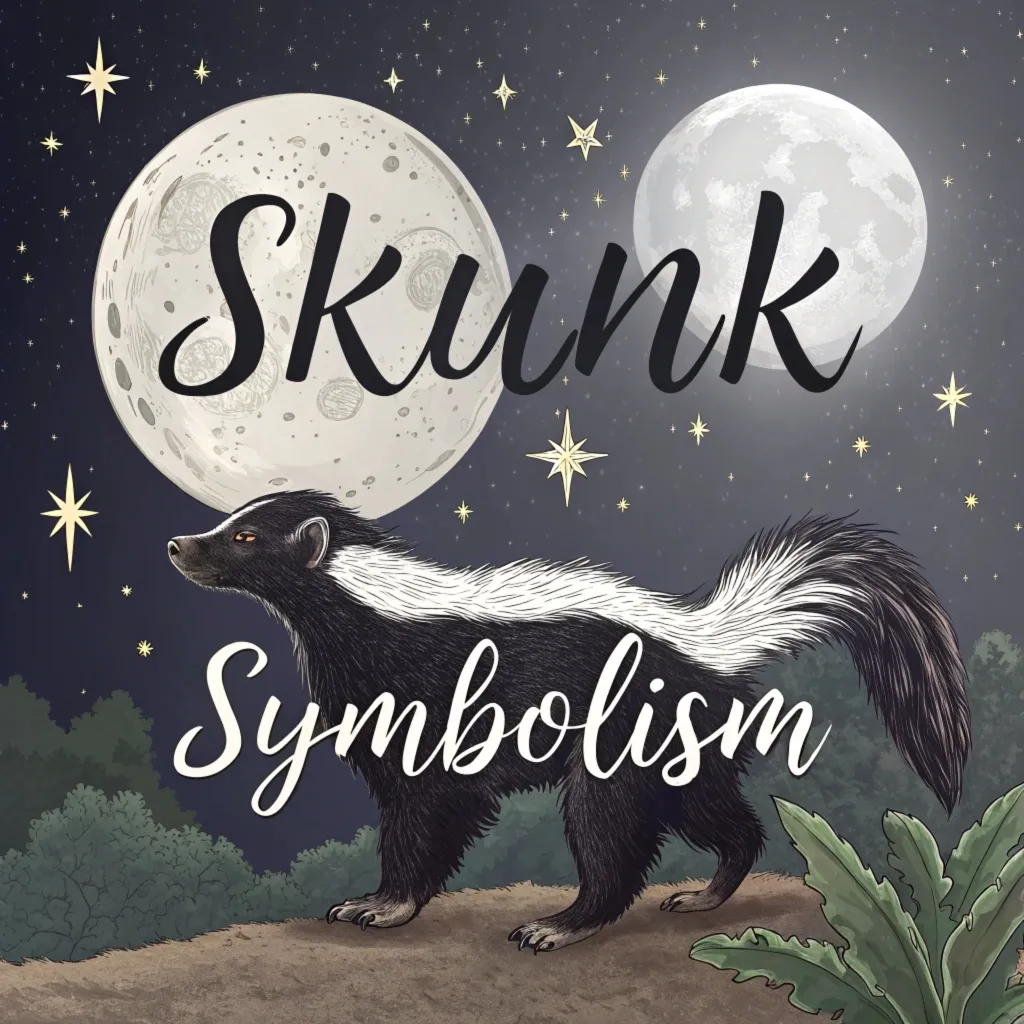Skunk Symbolism: Wisdom of this Powerful Totem Animal
Skunks, with their distinctive black and white fur, carry profound spiritual significance.
These creatures, often misunderstood, offer valuable lessons in confidence, self-respect, and peaceful assertiveness.
This comprehensive guide explores the deep spiritual symbolism of skunks, their role as totem animals, and the wisdom they impart to those who encounter them.

Key Takeaways: Skunk Symbolism at a Glance
- Self-respect: Skunks embody the importance of maintaining dignity and self-worth.
- Confidence: These animals teach us to stand our ground with assurance.
- Peaceful assertiveness: Skunks demonstrate the power of diplomacy before resorting to defensive measures.
- Boundary setting: They symbolize the importance of establishing and maintaining personal boundaries.
- Transformation: Skunks represent the ability to adapt and change in various situations.
- Warning: Their presence often serves as a caution against potential dangers or negative influences.
- Uniqueness: Skunks encourage embracing individual qualities and standing out.
- Protection: They symbolize the ability to defend oneself when necessary.
- Justice: In some cultures, skunks represent a strong sense of fairness and justice.
- Sensuality: Skunks are associated with attraction and sexuality in certain spiritual contexts.
- Wisdom: Their behavior embodies strategic thinking and wise decision-making.
- Respect: Skunks teach the value of commanding respect without aggression.
- Balance: They represent finding equilibrium between assertiveness and peaceful coexistence.
- Spiritual awareness: Encountering a skunk often signifies a need for spiritual introspection.
- Self-assurance: Skunks inspire confidence in one’s abilities and decisions.
The Spiritual Significance of Skunks
Skunks hold a powerful spiritual symbolism in various cultures and belief systems. These creatures, with their distinctive appearance and defensive mechanisms, offer profound lessons in self-respect and confidence.
The spiritual essence of skunks resonates with those seeking to navigate life’s challenges with grace and assertiveness.
In many spiritual traditions, skunks are seen as messengers from the natural world, bringing important insights about personal boundaries and self-protection.
Their unique characteristics serve as a metaphor for human behavior and spiritual growth, offering valuable lessons for those who are open to receiving them.
The skunk’s black and white coloration is often interpreted as a symbol of duality, representing the balance between light and dark forces in the universe. This visual contrast serves as a reminder of the importance of maintaining equilibrium in our lives.
Skunks as Symbols of Self-Respect
The skunk’s ability to command respect without aggression serves as a powerful spiritual lesson. These animals teach us the importance of maintaining our dignity and self-worth in all situations.
Their confident demeanor and defensive capabilities remind us that we can stand tall and assert ourselves without resorting to hostility.
Skunks demonstrate that true self-respect comes from within and doesn’t require external validation.
By embodying this principle, they inspire us to cultivate a strong sense of self-worth that remains unshaken by the opinions or actions of others.
The skunk’s approach to self-respect aligns with many spiritual teachings that emphasize the importance of inner strength and self-acceptance. Their symbolism encourages us to value ourselves intrinsically, regardless of external circumstances.
Confidence and Peaceful Assertiveness

Skunks stroll fearlessly through their environment, embodying confidence. This behavior encourages us to face life’s challenges with assurance and calm determination.
Their peaceful yet assertive nature serves as a model for how we can navigate our own lives with grace and strength.
The confident gait of a skunk reminds us that we can move through the world with self-assurance, even when faced with potential threats or obstacles.
This aspect of skunk symbolism teaches us to trust in our own abilities and to approach challenges with a calm and centered mindset.
Skunks exemplify the principle of peaceful assertiveness, showing that one can be both gentle and strong simultaneously. This balance is a valuable lesson for those seeking to assert themselves without causing unnecessary conflict.
The Power of Boundaries
In the spiritual realm, skunks represent the importance of setting and maintaining personal boundaries. They teach us to protect our space and energy without resorting to hostility.
The skunk’s defensive spray serves as a powerful metaphor for the importance of establishing clear limits in our relationships and interactions.
By observing how skunks defend their territory, we can learn valuable lessons about protecting our own physical, emotional, and spiritual space.
This symbolism encourages us to be clear about our boundaries and to enforce them when necessary, always with respect for ourselves and others.
The concept of boundaries in skunk symbolism extends beyond the physical realm, encompassing emotional and spiritual boundaries as well. It reminds us of the importance of safeguarding our inner peace and well-being.
Skunks as Symbols of Transformation

The skunk’s ability to adapt to various situations symbolizes personal transformation and growth. This aspect of skunk symbolism encourages flexibility and resilience in the face of change.
Skunks demonstrate that we can evolve and thrive in different environments, adapting our strategies as needed.
Their transformative symbolism reminds us that change is a natural part of life and that we have the capacity to adjust and grow through various experiences. This perspective can be particularly comforting during times of transition or uncertainty.
Skunks teach us that transformation doesn’t always have to be dramatic; sometimes, it’s about making subtle adjustments to navigate life more effectively. Their symbolism encourages us to embrace change as an opportunity for growth and self-improvement.
The Warning Aspect of Skunk Symbolism
Encountering a skunk often serves as a spiritual warning sign. It may indicate the presence of negative influences or potential dangers in one’s life.
The skunk’s distinctive odor can be interpreted as a metaphorical wake-up call, urging us to pay attention to our surroundings and intuition.
This warning aspect of skunk symbolism reminds us to be vigilant and aware of potential threats to our well-being. It encourages us to trust our instincts and take protective measures when necessary, just as a skunk uses its spray as a last resort.
The warning symbolism of skunks also extends to internal dangers, such as negative thought patterns or self-destructive behaviors. It prompts us to examine our lives and address any harmful elements that may be present.
Embracing Uniqueness
The skunk’s distinctive appearance reminds us to embrace our individuality. This symbolism encourages us to stand out and celebrate our unique qualities.
Skunks teach us that our differences are not just acceptable but valuable, inspiring us to express our authentic selves without fear of judgment.
By embodying their unique characteristics unapologetically, skunks show us the power of self-acceptance and the importance of honoring our true nature. This aspect of skunk symbolism can be particularly empowering for those who feel pressured to conform to societal norms.
Skunks remind us that our uniqueness is our strength, and that by embracing our individual qualities, we can make our own special contribution to the world.
Skunks as Protectors
In spiritual contexts, skunks symbolize protection and self-defense. They teach us to stand our ground and defend ourselves when necessary, but always as a last resort.
The skunk’s ability to deter predators without physical confrontation serves as a powerful metaphor for effective self-protection.
This protective symbolism extends beyond physical defense to include emotional and spiritual protection.
Skunks remind us of the importance of safeguarding our energy and well-being from negative influences or toxic relationships.
The protective aspect of skunk symbolism also encourages us to be guardians not just for ourselves, but for those who may be vulnerable in our communities. It inspires a sense of responsibility and courage in standing up for what is right.
The Justice Aspect of Skunk Symbolism
Some Native American cultures associate skunks with a strong sense of justice and fairness. The skunk’s spray represents the ability to make justice prevail.
This symbolism teaches us about the importance of standing up for what is right, even when it may be uncomfortable or challenging.
Skunks remind us that justice doesn’t always require aggression or force. Their approach to defense demonstrates that sometimes, the most effective way to address injustice is through non-violent means that make a strong statement.
The justice aspect of skunk symbolism also encourages us to examine our own actions and ensure that we are treating others fairly and ethically.
It prompts us to consider the consequences of our choices and to strive for balance and equity in our interactions.
Skunks and Sensuality
In certain spiritual interpretations, skunks symbolize sensuality and attraction. Their ability to both repel and attract serves as a metaphor for personal magnetism.
This aspect of skunk symbolism reminds us of the power of allure and the importance of understanding our own attractive qualities.
The skunk’s association with sensuality teaches us about the delicate balance between attraction and boundaries.
It reminds us that true sensuality involves not just physical appeal, but also emotional intelligence and respect for personal space.
This sensual aspect of skunk symbolism can inspire us to embrace our own sensual nature and to approach relationships with confidence and self-awareness. It encourages a healthy appreciation of physical and emotional intimacy.
The Wisdom of Skunks
Skunk symbolism embodies strategic thinking and wise decision-making. Their behavior teaches us to use our abilities judiciously and effectively.
The skunk’s approach to defense, using its spray only as a last resort, demonstrates the importance of thoughtful action and conservation of energy.
This wisdom aspect of skunk symbolism encourages us to approach challenges with intelligence and foresight. It reminds us to consider all our options before taking action and to use our resources wisely.
Skunks teach us that true wisdom often lies in knowing when to act and when to hold back. Their symbolism inspires us to cultivate patience and discernment in our decision-making processes.
Commanding Respect Without Aggression
Skunks demonstrate how to command respect without resorting to aggression. This aspect of their symbolism encourages peaceful yet assertive interactions.
By simply being themselves and standing their ground, skunks show us that respect can be earned through presence and confidence rather than force.
This lesson in commanding respect is valuable in both personal and professional contexts. It teaches us that we can assert ourselves and maintain our boundaries without compromising our integrity or resorting to hostile behavior.
Skunk symbolism in this context encourages us to develop a strong sense of self-worth that naturally commands respect from others.
It reminds us that true respect is earned through our actions and character, not through intimidation or aggression.
Finding Balance Through Skunk Symbolism
The skunk’s behavior represents a balance between assertiveness and peaceful coexistence. This symbolism teaches us to find equilibrium in our interactions with others.
Skunks demonstrate that it’s possible to be strong and gentle simultaneously, inspiring us to cultivate these seemingly opposing qualities within ourselves.
This aspect of skunk symbolism is particularly relevant in today’s world, where finding balance in our personal and professional lives can be challenging. It encourages us to strive for harmony in our relationships and environments.
The balance represented by skunks also extends to our inner world, reminding us to find equilibrium between our various needs and desires.
It teaches us the importance of self-care alongside our responsibilities to others.
Spiritual Awareness and Skunk Encounters
Encountering a skunk often signifies a need for spiritual introspection. It may indicate a time to reassess our spiritual path and personal growth.
Such encounters can serve as a wake-up call, prompting us to pay closer attention to our inner world and spiritual development.
Skunk encounters in the spiritual context often suggest that it’s time to examine our beliefs, values, and life direction.
They encourage us to delve deeper into our spiritual practices and to seek greater alignment with our true selves.
These spiritual encounters with skunks can also be interpreted as messages from the universe or our higher selves, urging us to trust our intuition and to be more mindful of the spiritual dimensions of our lives.
Skunks as Symbols of Self-Assurance
The confident demeanor of skunks inspires us to have faith in our abilities and decisions. This aspect of skunk symbolism encourages self-trust and assurance.
Skunks teach us that true confidence comes from within and is not dependent on external validation or circumstances.
By observing how skunks move through the world with certainty and poise, we can learn to cultivate our own sense of self-assurance.
This symbolism reminds us that we have the inner resources to face life’s challenges with confidence and grace.
Skunk-inspired self-assurance can help us overcome self-doubt and fear, enabling us to pursue our goals and dreams with greater determination and resilience. It encourages us to trust our instincts and to stand firm in our convictions.
FAQs About Skunk Symbolism
What does it mean to see a skunk in a dream?
Seeing a skunk in a dream often symbolizes a warning against deception or the need to address unpleasant truths. It may also indicate the importance of discernment in your waking life. Dreams featuring skunks can be interpreted as reminders to trust your instincts and to be aware of potential threats or negative influences in your environment.
How do Native American cultures view skunks?
Many Native American tribes see skunks as powerful omens and symbols of danger and fearlessness. Some cultures used skunk-related items for protection against diseases. In certain Native American traditions, skunks are associated with medicine and healing, representing the power to ward off negative energies and promote spiritual cleansing.
What does a skunk tattoo symbolize?
A skunk tattoo can represent independence, self-defense capabilities, or feeling like an outsider. In some Native American cultures, it may symbolize a deceased loved one or ancestor. Skunk tattoos can also be interpreted as symbols of confidence, uniqueness, and the ability to stand one’s ground in the face of adversity.
How can I connect with skunk energy?
To connect with skunk energy, practice standing your ground confidently, setting clear boundaries, and embracing your unique qualities. Meditation focusing on these attributes can help strengthen your connection. You can also try visualizing a skunk during meditation or carrying a skunk totem or image as a reminder of its spiritual lessons.
What does it mean if a skunk crosses your path?
A skunk crossing your path may be a sign to pay attention to your surroundings and personal boundaries. It could also indicate a need for more confidence or self-respect in your life. Such an encounter might be interpreted as a message to trust your instincts and to be prepared to defend your personal space or beliefs if necessary.

Isabella is the author behind Divine Spiritual Path. With over a decade of experience in exploring various spiritual traditions and practices, she is passionate about sharing her insights and knowledge with others. Isabella believes that spirituality is a personal journey that can enrich our lives and foster deeper connections with ourselves and the universe. Through her writing, she aims to inspire and guide readers on their own paths to enlightenment and self-discovery.







